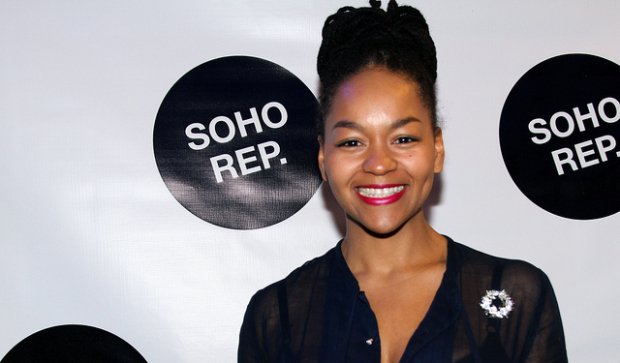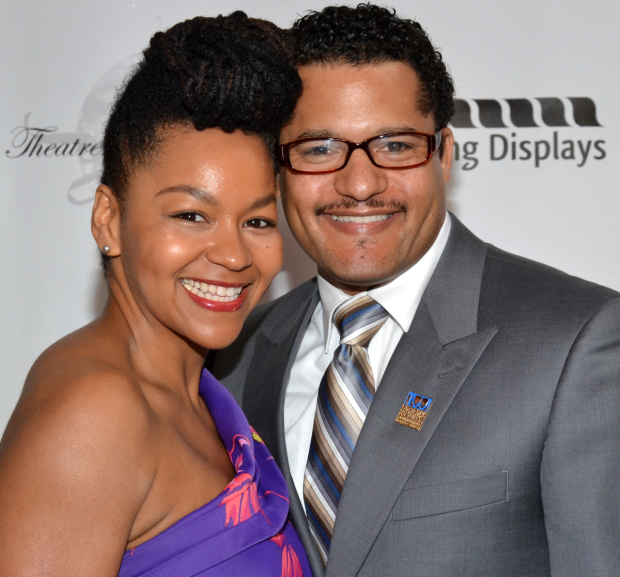It's a Family Reunion for Crystal A. Dickinson in August Wilson's Seven Guitars
Crystal A. Dickinson — a Broadway veteran known for her roles in Clybourne Park and You Can't Take It With You — made her off-Broadway debut alongside her husband, Brandon J. Dirden, and brother-in-law Jason Dirden back in 2008 in Signature Theatre's The First Breeze of Summer. Brandon himself shared the story behind this family debut just a few months ago before his run in Your Blues Ain't Sweet Like Mine at Red Bank, New Jersey's Two River Theater. That same theater is now hosting Brandon's directorial debut with a production of August Wilson's Seven Guitars — and fittingly, his wife and brother are joining him for the landmark occasion in two of the play's starring roles.
TheaterMania spoke with Dickinson about this latest family project, which features Jason in the role of Canewell and herself as Louise — a mother figure to Wilson's cast of characters living in post-war Pittsburgh in 1948. As the fifth installment of Wilson's 10-part Pittsburgh Cycle, the play continues the playwright's exploration of racial identity in America, inspiring the actress to reflect on her own family's American heritage, her personal artistic trajectory, and the next generation of August Wilson scholars.

(© David Gordon)
This production of Seven Guitars is another family collaboration for you and the Dirden brothers. Who initiated this project for the three of you?
Brandon just put a little bug in [artistic director] John Dias' ear more than a year ago and said that he might have an interest in directing. He said he would like to direct Fences and he wanted to cast Ruben Santiago-Hudson and this other marvelous actress named Brenda Pressley who actually was in The First Breeze of Summer with us many years ago. The opportunity arose to do Seven Guitars, so he asked Brandon to do it and Brandon was like, "Uh, I meant maybe, you know, like in a couple of years." [laughs] But [John] mentioned he was interested in me being a part of the production and Jason just happened to be free at this time, so it all worked out. The first really big thing we all did in New York City was The First Breeze of Summer at the Signature theater. That was a big point in all three of our careers. Now we get to be together again for another big milestone — Brandon's directorial debut — and it just feels so right.
Was Louise a role that initially appealed to you when you read the play?
When [John] mentioned doing Seven Guitars, he said, "Crystal could play Vera." [But] when I read the script though, I just thought Louise would be — I don't know. I think at this point in my life it just felt a little more interesting to me. And Brandon was over the moon because Canewell was a dream role for Jason, but Brandon couldn't hire Jason to play Canewell if I was going to play Vera. That would just be too weird because they're supposed to be love interests. So Brandon came to me and he said, "You know, you can do Vera but maybe just take a look at Louise." And I was like, "Oh my god, that's what I want to do anyway!" So then he was able to hire Jason in the role that he wanted him to do and a role that Jason really always wanted to do.
Why does a role like Louise appeal to you more than a character like Vera at this point in your life?
I'm a relatively new mom and I'm a wife. Vera is at a point in her life where she doesn't quite know what decision she's going to make or where she's going to go. Louise in my mind just seemed more settled and more secure about herself. Maybe she's not happy with everything in her life but she understands a little bit more about life in a way that Vera is still searching for. Maybe it's because I'm happy and feel secure in my own personal life. At this point in my life that kind of search didn't interest me.
Seven Guitars falls right in the middle of Wilson's Pittsburgh Cycle and takes place in 1948. How do you find a connection with characters from this time period?
I'm very interested in seeing the social consciousness of this country — how it has grown and how it is challenging itself. [I find] myself thinking about my grandmother a lot. When I did Clybourne Park, in the first act, there's the woman who is a maid in the house, and that's what my grandmother did for a living. And now I'm doing this play here in 1948 and I'm literally wearing my grandmother's clip. I brought it in for the costume designer, she was like, "It's beautiful, yes, absolutely wear it!" I think I'm always making these connections and it's important to me to give honor to things that have come before and see how they connect with me still.

(© David Gordon)
How can audiences find their way into a period piece like this?
In Seven Guitars, there are things that we [still] talk about. A great example is [the] shooting in the play. Miss Tillery's son gets shot [and] the newspaper article says that the criminal shot but the officer shot the criminal in the back. So the question is how in God's earth could somebody be shooting at somebody and get shot in the back at the same time? It can't really happen. And here we are right now. I mean, pick a riot as a result of something like that. These things are still resonant…unfortunately.
You've been a judge at Kenny Leon's August Wilson Monologue Competition for several years now. What is it like seeing the next generation of artists embracing his work?
There's really no feeling like it. Sometimes they're reading monologues from fifty-year-old men or forty-five-year-old women — and they're eighteen years old! What they manage to understand from August Wilson's text, it's amazing. It's a testament to August's writing, I think, but also a testament to these young people's spirits and what they're willing to give themselves over to. Some of these monologues, they talk about some really rough, deep-core stuff, and just to watch it — it makes you proud. His spirit is there, but if he were alive, I know August would be there.
Are there any roles on your August Wilson bucket list?
Brandon and I talk about this all the time. We would love to do Joe Turner's Come and Gone and play Seth and Bertha. I would adore playing a married couple to Brandon onstage.











